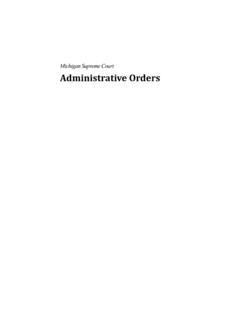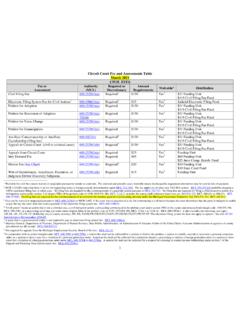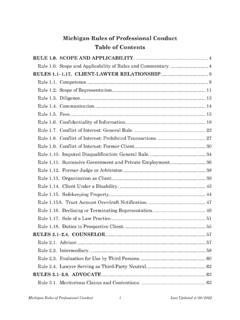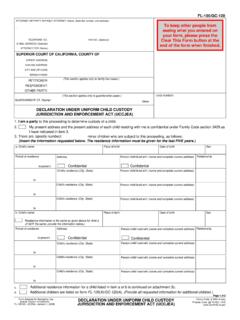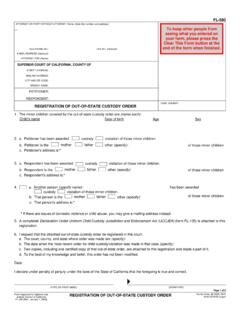Transcription of MICHIGAN CUSTODY GUIDELINE
1 M I C H I G A N. CUSTODY . GUIDELINE . FRIEND OF THE COURT BUREAU/STATE COURT ADMINISTRATIVE OFFICE. MICHIGAN SUPREME COURT. MICHIGAN CUSTODY GUIDELINE State Court Administrative Office Friend of the Court Bureau 309 N. Washington Square Box 30048. Lansing, MI 48909. (517) 373-4835. The CUSTODY GUIDELINE is supported by the Access and Visitation Grant, Office of Child Support Enforcement, Department of Health and Human Services. Points of view in this document are those of the authors and do not necessarily represent the official position or policies of the Department of Health and Human Services. Acknowledgments Table of Contents The MICHIGAN CUSTODY GUIDELINE was developed by Friend of the Court personnel, State Court Administrative Office staff, and in association with the MICHIGAN Family Independence Agency. The recommendations presented in the CUSTODY GUIDELINE represent these employees' professional Definitions of judgment and do not constitute recommendations from the MICHIGAN Supreme Court and should not be viewed as definitive in all cases.
2 Factors of the Child CUSTODY We wish to thank the following Friend of the Court personnel for their review of the MICHIGAN CUSTODY GUIDELINE : Established Custodial Environment ..4. Bruce Basom 8th Circuit County Friend of the Court Office Children Deciding Where They Want to Live ..5. Margaret Cornish 36th Circuit County Friend of the Court Office Terry Cornwell 29th Circuit County Friend of the Court Office The Role of the Judge in CUSTODY Steve Cotton 20th Circuit County Friend of the Court Office Nanette Courson 13th Circuit County Friend of the Court Office The Friend of the Court CUSTODY Vicki L. Crum 7th Circuit County Friend of the Court Office George L. Ebenhoeh 33rd Circuit County Friend of the Court Office The Difference Between A Domestic Relations Referee and A Judge ..10. Retha J. Filhart 42nd Circuit County Friend of the Court Office Carolyn L. Hanson 25th Circuit County Friend of the Court Office Mediation.
3 11. Julie Haveman 17th Circuit County Friend of the Court Office Emil H. Joseph, Jr. 40th Circuit County Friend of the Court Office Child CUSTODY Modifications ..13. Jennifer J. Lester 43rd Circuit County Friend of the Court Office Daniel Jon Loomis 35th Circuit County Friend of the Court Office Third Person Dave Manki 32nd Circuit County Friend of the Court Office Connie Miller 19th Circuit County Friend of the Court Office Changing the Child's Residence ..17. Mark Niemeyer 51st Circuit County Friend of the Court Office Jeffery A. Radike 8th Circuit County Friend of the Court Office Pamphlets and Handbooks Available to the Public ..19. Lorraine Osthaus Randolph 6th Circuit County Friend of the Court Office Barb Smyrnios 9th Circuit County Friend of the Court Office Laws Associated with Domestic Relations Litigation ..20. Arthur R. Spears, Jr. 6th Circuit County Friend of the Court Office Dennis Swain 19th Circuit County Friend of the Court Office Definitions.
4 21. William Thistlethwaite 45th Circuit County Friend of the Court Office Dale Truemner 54th Circuit County Friend of the Court Office Frequently Asked CUSTODY Questions ..25. Diane Valente 44th Circuit County Friend of the Court Office Tom Whitesell 37th Circuit County Friend of the Court Office Karrie Wichtman 48th Circuit County Friend of the Court Office Introduction Definitions of CUSTODY The CUSTODY GUIDELINE contains information addressing many of the issues associated with establishing Judges can order different CUSTODY arrangements. Parents can agree to a CUSTODY arrangement and judges and modifying CUSTODY . It also provides information relevant to the most common CUSTODY arrangements. will usually sign the court order for the arrangements as long as they believe the agreement is in the best Although the CUSTODY GUIDELINE provides information on numerous subjects, the reader is reminded that interests of the child.
5 The following are descriptions of various CUSTODY arrangements. the information presented is not a listing of all the subjects and issues relevant to CUSTODY . SOLE CUSTODY : There is no legal definition for sole CUSTODY . For the purpose of the MICHIGAN CUSTODY Child CUSTODY is a term that refers to rights and responsibilities for each parent and child. CUSTODY is not GUIDELINE , sole CUSTODY occurs when primary physical CUSTODY and legal CUSTODY are given to one parent. a term used to indicate ownership, but rather a determination of the time a child is going to be with each Physical CUSTODY is when a parent provides most of the day to day care for the child. Legal CUSTODY is parent and each parent's responsibility to make decisions on behalf of the child. CUSTODY can be modified when a parent has the responsibility of making all major decisions regarding the child's upbringing (such to accommodate significant changes in the lives of the children or the parents involved.)
6 The judge as medical treatment, school enrollment, religious instruction, and participation in extracurricular activi- attempts to structure CUSTODY to promote a strong relationship between children and their parents. The ties). If the judge believes the parents cannot work together for the benefit of their child, sole CUSTODY is only time this is not true is when the judge determines that CUSTODY with a particular individual would usually awarded to one parent. The other parent may be given parenting time, as determined by the endanger the child's physical, mental, or emotional health. court. If parenting time is ordered, the non-custodial parent is responsible for making routine and emer- gency decisions for the child during parenting In CUSTODY matters judges are asked to decide who will make decisions for a child and when a child is going to be with each parent. If parents in CUSTODY cases have not reached an agreement, the judge is JOINT CUSTODY : At the request of either parent, the court must consider ordering joint CUSTODY .
7 If the asked to determine when a child is going to be with each parent. However, parents in CUSTODY cases who parents agree on joint CUSTODY , the court must order it unless the court determines that joint CUSTODY is decide to work together can decide the CUSTODY agreement with the help of their attorneys, the help of the not in the best interests of the child. When deciding, judges must state on the record their reasons for friend of the court office, and/or the process of mediation. Parents can, on their own, also work through granting or denying the request. Judges may consider joint CUSTODY without a parent's request. In addi- the court system to obtain or modify CUSTODY by filing the proper paperwork. tion to the normal factors considered when deciding CUSTODY , with joint CUSTODY judges must also consider whether the parents will be able to cooperate and generally agree concerning important decisions affect- There are several CUSTODY arrangements that can be agreed upon by parents or ordered by the judge.
8 Ing the welfare of the The statute defines joint CUSTODY in a way which provides for joint legal However, in CUSTODY disputes parents must be advised of joint CUSTODY . At the request of a parent the CUSTODY , joint physical CUSTODY , or a combination of joint legal and joint physical CUSTODY . judge must consider awarding joint CUSTODY and must state during a hearing the reasons for granting or denying the request. The judge must decide if joint CUSTODY is in the best interests of the child. The THE FOLLOWING ARE 2 TYPES OF JOINT CUSTODY : judge could award joint CUSTODY and equally divide the time the child spends with each parent. However, JOINT LEGAL CUSTODY : Joint legal CUSTODY means that parents share decision-making authority as to the judge could also award joint CUSTODY and not equally divide the time the child spends with each par- the important decisions affecting the welfare of the Joint CUSTODY does not depend on the amount ent.
9 For example, the judge could award joint CUSTODY , with one parent having physical CUSTODY during of time the child is with each parent. the school year and the other parent having physical CUSTODY during the summer vacation period. NOTES TO THE READER: This document (with the exception of the Factors of the Child CUSTODY Act) uses the term, parent. At times some- one other than a parent will be involved in a CUSTODY dispute. Many concepts, aspects, and laws apply the same to third persons as they would to parents, but there are also some differences. Information regarding third persons having CUSTODY are explained later in this document. Judge will be used throughout this document. Judges make decisions about CUSTODY , parenting time, and child support. When judges make decisions, the decisions are written down and signed by the judges. These are called court orders. Many publications use the term court instead of judge.
10 This is done because courts are the institutions that interpret and enforce laws, and judges are the persons who have the responisbiliy to make court orders. There is also a person called a domestic relations referee. This person makes recommendations for an order about cus- tody, parenting time, and child support. That recommendation becomes an order of the court when approved by a judge. There are other important differences between a domestic relations referees, friend of the court employees, and judges. Those differences are explained later in this document. 1 In particular, the Child CUSTODY Act, MCL (9) gives a parent exercising parenting time the right and duty to decide all routine matters concerning the child. Joint CUSTODY is defined in the Child CUSTODY Act, MCL (7). All CUSTODY is slightly impacted by provisions on parenting time Throughout this document there are references to the laws.
